Aug
7
2009
or Having No Controversies With God
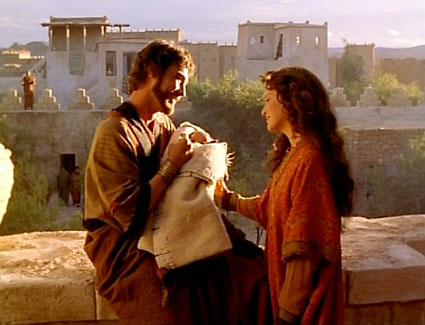
The devil hates confession. It breaks his power over us. He would rather have us confine ourselves behind the bars of our own private Sheols than get right with God.
Why is confession so powerful? Because it is judicial. It is an application of the knowledge of good and evil. Continue reading
6 comments | tags: Bathsheba, David, Feasts, James Jordan, Nathan, Peter Leithart, Saul, Solomon, Systematic typology | posted in Biblical Theology, Christian Life, Quotes, Totus Christus
Jul
28
2009

How smart is this Book?
As discussed, if we begin with Saul’s anointing by Samuel, subsequent events follow the Feasts outline. Saul’s failure to kill Amalek is at Pentecost and his failure to defeat Goliath is at Atonement.
BUT… if we begin with David’s secret anointing by Samuel, subsequent events also follow the Feasts. This time, however, David’s slaying of Goliath is at Pentecost (the serpent/beast in the wilderness). Guess what’s at Atonement?
Continue reading
1 comment | tags: Amalek, Bible Matrix, Circumcision, David, Eglon, Ezekiel, Feasts, goliath, High Priest, Saul, Sidon, Systematic typology, Tabernacles, Tyre | posted in Biblical Theology
Jul
27
2009
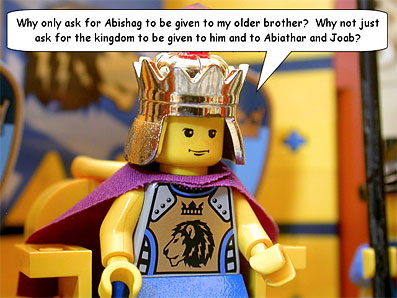
Eli’s corrupt priesthood came to an end when the Ark was taken by the Philistines. Saul’s corrupt kingdom came to a full end when the Ark returned (hence Michal’s barrenness). The last of Eli’s priesthood (Abiathar) was exiled when Solomon’s government began. Solomon’s kingdom was a new firmament (1 Kings 10:19). Isaiah, however, saw it being rolled up like a scroll (Is. 34:4).
Continue reading
Comments Off | tags: Abiathar, AD70, Ark of the Covenant, Caiaphas, Cyrus, David, Eli, Feasts, High Priest, Literary Structure, Saul, Solomon, Systematic typology, Zechariah | posted in Biblical Theology, The Last Days
Jul
24
2009
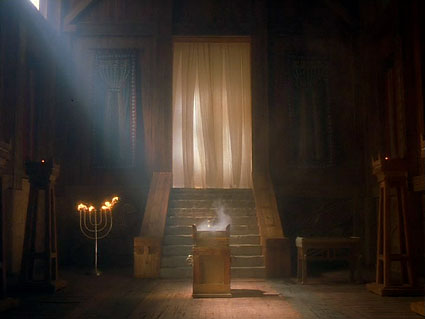
Time for another weird post I think. Here’s some thoughts on Genesis 2:
“This at last is bone of my bones and flesh of my flesh;
she shall be called Woman, because she was taken out of Man.”
Why the change from Adam and Eve to Ish and Isha? Perhaps because the words are symbolic, and symbols describe relationships.[1] There is the possibility that these words were used because they sound like eish (fire), regardless of their differing derivations (the jury is still out on this one after 6000 years). Jordan mentions that Adam was to be an Altar made of earth, and with his own blood shed comes the “fire” of Isha, the woman as the shining on the altar, the glory cloud on Mount Sinai. It certainly corresponds with the feasts. Adam “ascends” to headship over Eve in marriage (Firstfruits), and then he is to “open the Law” to Eve and fill her with light (Pentecost), which he did, but failed to repeat the Law (Trumpets) after she was tested. Atonement followed.
Continue reading
2 comments | tags: AD70, Adam, breastplate, Eve, Feasts, Genesis, Greater Eve, Incense Altar, Lampstand, Man of sin, Scavengers, Tabernacle, Temple | posted in Biblical Theology
Jul
22
2009
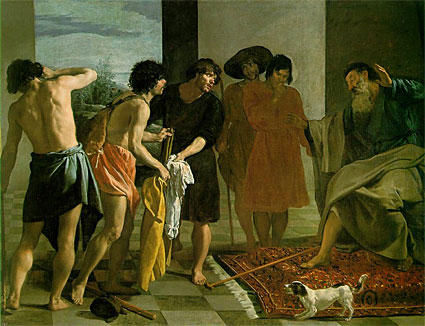
The first ‘cycle’ in the Joseph narrative wasn’t covered in Totus Christus. I have included it in Bible Matrix, and it contains some wonders.
Firstly, Joseph’s first dream (the bowing sheaves) is placed at Firstfruits – Day 3. His second dream (sun moon and stars) is at Pentecost – Day 4.
Secondly, Joseph receives his robe from Jacob at Passover (covering). It symbolises the firmament (Day 2). And his brothers cover it with goat’s blood at Atonement (covering). It symbolises the substitutionary animals and mediatory Man (Day 6). The giving and taking of the robe match chiastically.
Of course, these Scriptures predate the feasts in Leviticus 23.
Comments Off | tags: Atonement, Bible Matrix, Chiasm, Feasts, Firstfruits, Jacob, Joseph, Systematic typology, Veil | posted in Biblical Theology
Jul
19
2009
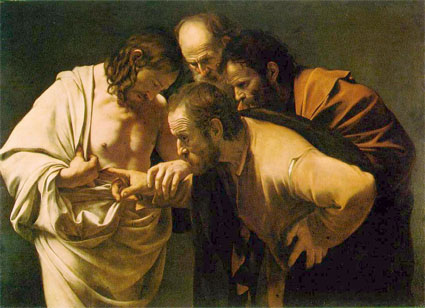
Sabbath - Then, the same day at evening, being the first day of the week,
…..Passover - when the doors were shut where the disciples were assembled,
…..for fear of the Jews,
Continue reading
Comments Off | tags: Feasts, John, Literary Structure, Passover, Systematic typology | posted in Biblical Theology
Jul
15
2009

Tim writes:
“[Totus Christus is] a book which certainly makes you think. While I have read other books on Biblical theology, looking at the structure of the Bible in that way (the Dominion pattern, feasts, etc.) is an idea which I’d never considered at all before. At first I didn’t quite get what each part of the pattern involves, even after you’d explained it, but after seeing it applied to a few sections of the Bible I was fine. I think its helped me get a better understanding of how God has revealed himself through the Bible. Continue reading
Comments Off | tags: Bible Matrix, Chiasm, Dominion Theology, Feasts, Literary Structure, Systematic typology | posted in Biblical Theology, Totus Christus
Jul
12
2009
“Nebuchadnezzar the king of Babylon has devoured me;
he has crushed me; he has made me an empty vessel;
he has swallowed me like a monster” (Jeremiah 51:34)
Continue reading
Comments Off | tags: Chiasm, Feasts, Jonah, Literary Structure | posted in Biblical Theology
Jul
9
2009
This passage is arranged symmetrically (chiasmus) but is also progressive, following the pattern of the Feasts (which also follow the pattern of Genesis to Judges).
Sabbath/Genesis – Paul’s word of greeting (Grace and peace)
……….Passover/Exodus – Divisions in the church
………………..Firstfruits/Leviticus – Wisdom of Christ
…………………………Pentecost/Numbers – Crucifixion of Christ
………………..Trumpets/Deuteronomy – Mind of Christ
……….Atonement/Joshua – Divisions in the church
Tabernacles/Judges – The Day will declare (judge) it (Church as Sabbath-Temple)
Kelby asked if these patterns are simply the work of the Holy Spirit, or if the authors of the Bible were consciously composing their writings in this manner. Good question. I think the answer is both. Bible books sometimes arrange events out of chronological order to fit this pattern. But then, Bible history also follows this pattern at various levels. The authorship of Scripture is like the humanity and divinity of Christ: inseparable.
Comments Off | tags: Chiasm, Feasts, Paul, Typology | posted in Biblical Theology
Jun
30
2009
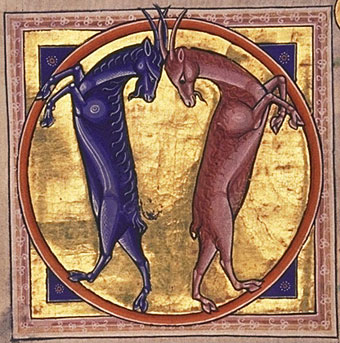 “And their dead bodies will lie in the street of the great city which spiritually is called Sodom and Egypt, where also our Lord was crucified.” – Revelation 11:8
“And their dead bodies will lie in the street of the great city which spiritually is called Sodom and Egypt, where also our Lord was crucified.” – Revelation 11:8
Revelation 20 makes it clear that the “second death” is the lake of fire. But an analysis of the literary structure of Revelation brings out an interesting factor.
Continue reading
Comments Off | tags: Against Hyperpreterism, Armageddon, Atonement, Azal, Egypt, Feasts, James Jordan, Passover, Peter Leithart, Revelation 20, Smyrna, Sodom, Systematic typology, Tabernacle | posted in Biblical Theology, The Last Days, Totus Christus

































